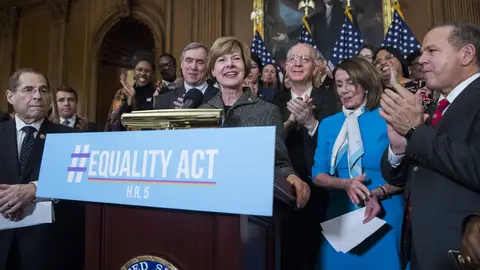Sen. Tammy Baldwin: "The March for Full Equality Continues"

In the following op-ed, Sen. Tammy Baldwin responds to the Supreme Court's ruling earlier this month affirming federal nondiscrimination protections for LGBTQ workers—and stresses that the fight for full equality has only just begun. To learn more about the trailblazing senator and Logo30 honoree, click here.
Once again, on a morning during Pride Month, our nation came closer to realizing the promise of equality for the LGBTQ community.
On June 15, 2020, the Supreme Court made clear that workplace discrimination against LGBTQ people is wrong, and our nation’s civil rights laws forbid it. While this is a huge step forward, many people in our community suffered for years without recourse.
There are countless stories of brave LGBTQ people who received pink slips, were passed over for promotions, suffered harassment and bullying in break rooms, or never got that interview—all simply because of who they are or who they love.
In particular, we must note the plaintiffs who brought these cases forward: Gerald Bostock, Aimee Stephens and Donald Zarda. Sadly, Aimee (pictured below) and Donald did not live to see this transformative moment for our community and our country. But we will remember them, honor the efforts that they and so many others have made to get us here, and commit ourselves to continuing the push for full equality for them.
The Supreme Court affirmed what dozens of federal courts, the Equal Employment Opportunity Commission, and so many of us have recognized for years: that Title VII of the Civil Rights Act of 1964 is properly understood to prohibit discrimination based on sexual orientation and gender identity.
This decision is far from radical, but it is transformative. It means that, at long last, in every corner of this country, in big cities and small towns, LGBTQ people are waking up in a fairer nation. They now know that they have recourse if an employer discriminates against them simply because of who they are or who they love. And employers know, unambiguously, that they have an obligation in every state to judge all of their employees on merit, not sexual orientation or gender identity.
While we have taken another step forward in the march toward full equality for LGBTQ Americans, we’re not there yet. LGBTQ people face discrimination in many more aspects of their lives than the workplace. Our country needs to send the message that treating people unfairly because of their sexual orientation or gender identity is wrong and will not be tolerated, period—whether that’s when buying a house, going out to dinner, shopping in a store, serving on a jury or seeking help from a government program.
While I would expect that any administration would now take a long, hard look at its wrong-headed efforts—based on legal arguments that the Supreme Court has just rejected—to rollback protections for LGBTQ people in education, health care and other areas, I do not have confidence in the Trump administration to do so. And there are areas of federal civil rights law, like those governing public accommodations and federal financial assistance, which do not yet prohibit discrimination based on sex.
Sen. Tammy Baldwin.
That’s why the Senate must take up and pass the Equality Act. Sens. Merkley, Collins, Booker, and I introduced this bipartisan measure to ensure that LGBTQ people have the same non-discrimination protections as other Americans by adding sexual orientation and gender identity, alongside protected characteristics like race and religion, to existing federal laws.
It would ban discrimination in a host of areas, including housing, public accommodations, jury service, access to credit, and federal funding, as well as employment. The bill would also strengthen our civil rights laws by adding protections against sex discrimination to federal laws where they had not been included previously, including those addressing public accommodations and federal funding.
More than a year ago, a bipartisan majority of the House of Representatives passed the Equality Act. Unfortunately, like so many other pieces of legislation that would improve the lives of the American people, it has been ignored by Senate Majority Leader Mitch McConnell and still sits in his legislative graveyard.
The Equality Act cannot be ignored any longer by this Senate. LGBTQ people should not have to wait any longer to enjoy the full protection of our nation’s civil rights laws. I am urging this Senate to build on the Supreme Court’s decision and act immediately to bring our nation closer to the promise of equality by passing the Equality Act.
Today, our nation is in the midst of an extraordinary moment. Thousands upon thousands are demanding that our country confront racial injustice and systemic racism. They rightfully call for change, and it is my hope that Congress will take an important step in righting some of these wrongs.
We have so much work to do, and I am keenly aware of the Black and brown LGBTQ people who experience discrimination and injustice in this country not just because of sexual orientation or gender identity, but also because of race or ethnicity.
As we approach another anniversary of the Stonewall Uprising that sparked the modern LGBTQ equality movement, I’m mindful of the leadership of Marsha P. Johnson and Sylvia Rivera, transgender women of color, in that historic moment.
I hope the brave legacy of these leaders, and the urgent needs of Black and brown LGBTQ people, will inspire us to take another step to strengthen the civil rights promise for all Americans and pass the Equality Act.





